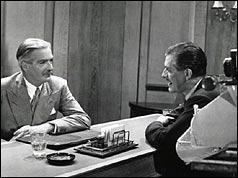
Today’s anniversary is of an event that might not have looked particularly significant at the time but, in actual fact, began a process that changed the face of politics in this country for ever.
The Prime Minister Sir Anthony Eden invited editors of national newspapers to 10 Downing Street and led a televised discussion as part of the 1955 electoral campaign.
“Sir Anthony was flanked by four ministers: the Chancellor, Rab Butler, the Foreign Secretary, Harold Macmillan, the Health Minister, Iain Macleod, and the Minister of Labour, Sir Walter Monckton.”The procedure seems to have been courteous with some sharp questioning by the editors, notably Hugh Cudlipp, who asked Eden about the common impression that he knew more about foreign affairs than domestic ones (with hindsight, perhaps, a questionable assumption).
Eden, it seems, reminded him of the nature of cabinet government. He himself may have spent more time on foreign affairs but he had always been part of a cabinet that also dealt with domestic matters.
“The programme was a welcome distraction in an election campaign which has been widely described as lacklustre, with one disenchanted journalist describing the early stages as "the lull before the lull".”All the political parties began to recognize the growing importance of TV and the dwindling importance of public meetings. And so, by stages we reached today’s situation when almost all politics is conducted on TV, the public meeting is a thing of the past with politicians rarely meeting anyone but carefully selected members of that public and even important announcements being made on the “box” rather than the House of Commons.
Probably the whole process was inevitable but one wonders whether Eden had the odd twinge of misgiving.
Carefully crafted TV audiences may be annoying, but I am not sure that seeing pictures of a politician kissing babies is much better. Surely if there had been no TV, or if TV had never been brought into political debate, politicians would have found some other way of trivialising the whole thing.
Well, indeed. As a quick re-read of the Eatansville election in "Pickwick Papers" shows. Babies do get kissed there as well.
I am currently reading an article by AJP Taylor entitled 'John Bright and the Crimean War'. Apparently Cobden and Bright both "felt it hopeless to contend against the war-fever of the press". Interestingly, according to AJP, newspaper readership at the time was around 100,000, so it would seem quite easy to contend against this fever. But then according to the page below 200,000 voters returned over 50% of MPs. So is it possible that the media was more critical to public opinion at the time than now because so few people were involved in decision making?
http://www.spartacus.schoolnet.co.uk/PRbright.htm